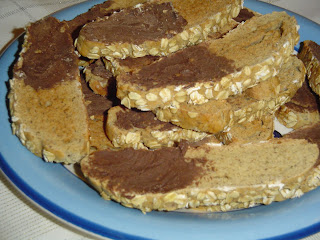


I have been working on a gelatin treat (licorice) for the dogs and I am finally happy with the consistancy and the dogs have given it 2 paws up. The dogs love them no matter which flavour I make them with - no sugar added juices or homemade broths. Below is an article that I found that explains how gelatin can help dogs now and also prevent problems in later years.
Enjoy.
Luka's Licorice
Ingredients
No sugar added juice, filtered water and gelatin.
OR
Homemade broth (no added salt or preservatives) filtered water and gelatin.
Cost: $4.00 1/2 pound
Gelatin for Arthritis in Dogs
By Jelena Woehr
eHow Contributing Writer
Gelatin contains glycine, an amino acid that has
anti-inflammatory and brain-protective properties. Adding plain, unflavored gelatin to a dog's food may prevent arthritis.
Function
1. Gelatin can help to prevent arthritis, arthrosis and other degenerative joint disorders. It functions by reversing or preventing glycine deficiency, which can lead to joint disease.
Types
2. Only plain, unflavored gelatin free of any additives or sweeteners should be fed to dogs.
Benefits
3. Benefits of gelatin for dogs with arthritis may include reduced inflammation and reduced pain. However, gelatin is most beneficial if fed as a preventive to help healthy dogs avoid joint disease.
Theories/Speculation
4. Carnivores naturally consume gelatin and its primary amino acid, glycine, in the skin, tendons and cartilage of their prey. Since most pet dogs do not eat skin, tendons and cartilage, some pet owners speculate that glycine deficiency is responsible for many cases of arthritis.



